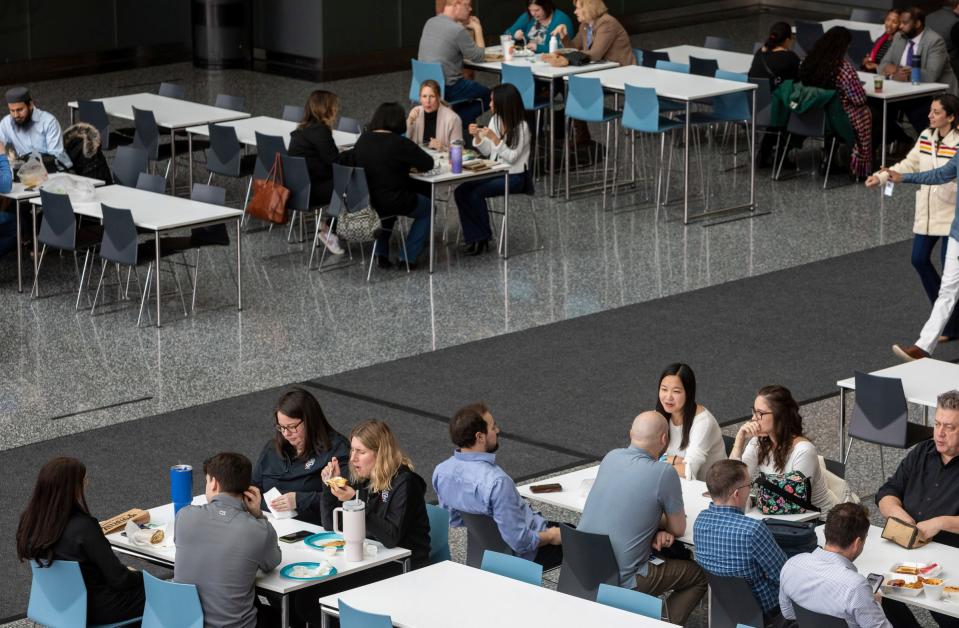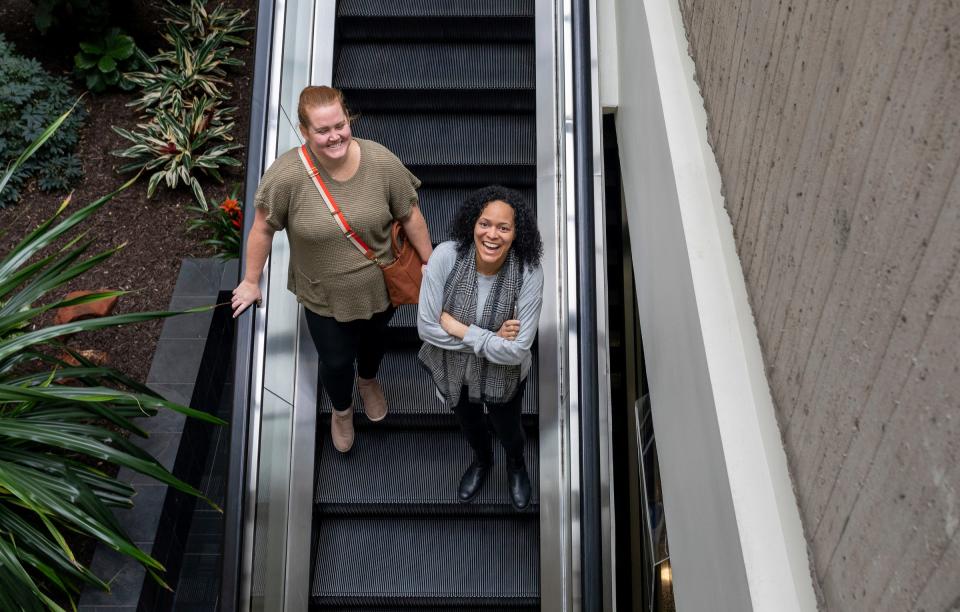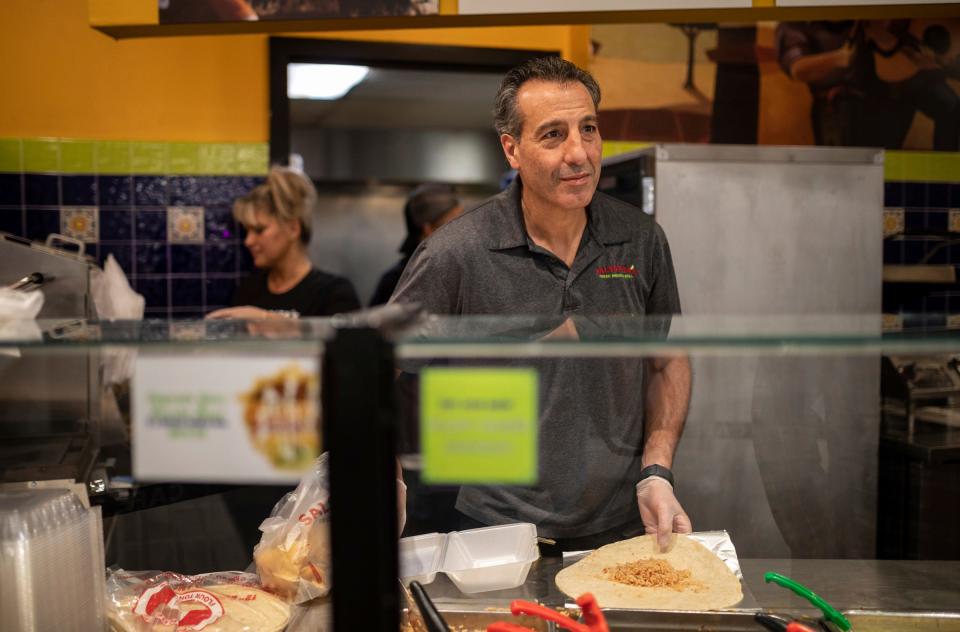The impact of GM's return-to-office policy for businesses inside Detroit's landmark
Eighteen months ago, there were no lines in the food court inside the Renaissance Center.
But now, on a Wednesday in late February, people stand one behind another at each of the four restaurants inside the iconic glass towers on Detroit's waterfront that house the world headquarters of General Motors.
"Can I help you?" a woman behind the counter at Burger King asks a customer. A grill sizzles in the background, there is the clang of pans accompanied by the symphonic purr from the humming cash registers — a glorious sound to the restaurant's owners who've been rebuilding the business since the COVID shutdown.
The customers, many of whom don badges that indicate they work for GM, are a welcome sight. Thousands of GM employees had populated five of the seven towers pre-COVID, but vanished during the pandemic to work remotely. Many remained remote after the pandemic shutdown.
It's a phenomenon that's spread across the city post-pandemic. The downtown vacancy rate was 19% in the third quarter last year, up from about 14% a year earlier, according to a report by commercial real estate services firm CBRE. Some notable recent moves were the departures of Meridian Health and BMC Compuware from downtown's One Campus Martius building (formerly the Compuware Building), which left 130,000 square feet of office space to fill, according to the CBRE report.

The formerly desolate RenCen also meant the food court went from about a dozen restaurants to four in recent years. The owner of one of the eateries cried the day he closed down, recalled Tony Keros, who opened Coney Town in the RenCen in 1978. Coney Town remains.
But on Jan. 8 things started to turn around in the food court. That's when GM's new policy kicked in, mandating that salaried workers come to the office three days a week. Lunch time business picked up. There are more GM employees at the RenCen, at least on Tuesdays, Wednesdays and Thursdays when they are mandated to be in the office. But the overall total numbers are believed to be lower than pre-COVID counts because GM transferred some employees from Detroit to its offices in Warren in recent months, restaurant owners said.
GM has confirmed a "small number" of employees have been transferred to other locations within southeast Michigan in recent years as the business and hybrid work arrangements evolved, said spokeswoman Tara Kuhnen. She declined to provide specific figures.
The restaurant owners are pleased to see more foot traffic and familiar customer faces again, but they say they still must rely on conferences and other events, such as the upcoming NFL draft in Detroit, for added revenue because GM's three days a week are not enough. They urge GM to get more of their workforce back at their desks.
"(GM President) Mark Reuss used to come here two times a week. Not anymore," Keros said. "(CEO) Mary Barra used to come three times a week for the Chicken Greek (salad). Not anymore. GM needs to fill up more towers. It is a Detroit product and their name is up there on the top of the building. They need a new way to bring more people back."
Kuhnen declined to comment.
GM's RenCen population
Exactly how many GM employees are assigned to work at the RenCen these days is unclear and GM is not saying. But in October 2022, the Free Press reported that about 5,000 employees were assigned to work at the RenCen, even though many continued to work remotely.
GM's website said, as of Thursday morning, that there were 857 employees working at the RenCen. Kuhnen said that number has not been updated to reflect increases since implementing the return to the office policy in January, but she declined to provide an updated figure. According to a screenshot of GM's website dated Oct. 3, 2023, which was obtained by the Free Press, GM listed 1,320 employees assigned to the RenCen at that time.
The RenCen had its 1977 grand opening with four 39-story office towers surrounding a central 73-story hotel, now a Marriott. All five original towers are owned by GM. Farmington Hills-based Friedman Real Estate said it bought the RenCen's 500 and 600 towers in December for an undisclosed price from a New Jersey utility company that had owned them for years.
Both towers, at 21 stories, opened in 1981. Today, Tower 600 is mostly vacant and Tower 500 is occupied by Blue Cross Blue Shield of Michigan.
So when the three neon-blue GM logo signs high atop the RenCen went dark starting in the summer and going through part of the fall, that caused some to worry. That, along with GM's smaller presence amid the labyrinth of corridors that make up the center, stirred speculation on social media that the automaker was abandoning its world headquarters building. GM told the Detroit Free Press then it was staying put and the signs were dark for routine maintenance.
GM's Kuhnen said she did not have an updated number of how many GM salaried employees are currently assigned to work at the RenCen, noting that it can change daily since some people work out of other GM locations if they have meetings elsewhere that day.
“We have nearly 36,000 employees based in southeast Michigan," Kuhnen said. "Our offices in and around metro Detroit are designed to be hubs for employees to collaborate where and when needed, so the number of people in different offices varies from day to day.”
But Patricia Vassallo recognizes the difference in bodies in the building. Vassallo works for Iron Mountain, which manages GM’s physical records. Her office is in a secured area in the RenCen's basement. She said she’s been coming to work since two months after the COVID lockdown ended in 2020.
“It was 9% full in here then,” Vassallo said of the RenCen in 2020. “We were alone. The constant person we’d see was the cleaning lady.”
The buildings are not as full as they were before COVID, Vassallo said, but having GM employees back even for three days a week is markedly noticeable.
“I used to be able to park right on the main floor and walk right in," Vassallo said. "Now I’m on the fifth floor and the traffic on those three days, it feels like normal, like it was before COVID. But if you come in on a Monday or Friday, it is much more desolate."
Bodies in the building
At Burger King, business has been steadily growing since COVID, said owner Kirk Roell.
“Since we reopened, which has been 2½ years from the COVID pause, our sales and traffic has been up every month, year-over-year and February is no different," Roell said. "It’s exceeding the previous year, same month.”
But he and the other restaurants look to conventions, such as the Motor City Tattoo Expo that ran March 1-3 at the Marriott Hotel, which attracted thousands of tattoo aficionados, to supplement revenue not made on days when workers are remote. Three of the restaurants in the food court told the Free Press they stay open longer hours when there are big events that might drive business.
"Every additional body in the building helps," Roell said. "We plan for it and expect to see a large influx of people, it helps greatly. So the more the city rebounds, the more the people come back, whether it’s for a convention or work, we’ll accept anyone who walks in the door.”
Mayor Mike Duggan's office did not provide a comment on how GM's three-day return to the RenCen offices is impacting the city.
Return to five days in the office
No matter what the events, the fact remains that the RenCen is primarily an office building, leaving the restaurants to look for the bulk of their business to come during the five work days each week from 11 a.m. to 2 p.m. So having GM workers coming back in is significant, the restaurant owners said.
In February 2023, Coney Town served about 75 people a day. This February it was averaging nearly 150, said Keros' son, Demetre Keros, owner of Coney Town. The increase is far from the pre-COVID crowd, when lines stretched so far back they nearly brushed against the GM World display of vehicles in the center atrium. Then, Coney Town served 500 to 600 people a day, he said.
“Even though we’re up, let’s say 20% to 30% on average, we still need a lot of growth to move forward," Demetre Keros said, adding he has not done any hiring yet. "Profit margins are tight when you’re doing sales that aren’t where they should be. You try to cut where you can. We’re more day-to-day, do what we can between me and my dad helping out. We cover the extra business.”

He envisions GM moving people to the RenCen from its other locations some day and eventually pushing toward five days at the office again.
“I can’t imagine that they’re not going to be bringing people back into this building," Demetre Keros said. "We know it’s going to take time to get back to five days a week. We’re willing to work with GM and understand that is where they’re going. It makes us know that long-term we have a future in the Renaissance Center with GM."
But GM does not have any near-term plans to bring employees back to the office five days a week, said GM spokesman Kevin Kelly. He said any discussion of changes to GM's policy longer term would be speculation.
GM's struggle to bring people back
As it stands, many salaried workers at GM have resisted any return to the office the company has tried to enforce so far.
In September 2022, GM said in internal messages to employees that it would end its Work Appropriately philosophy, which allowed for flexibility on where employees did their jobs, and ask them to come to the office three days a week.

But after much employee pushback, Barra sent out a note to the salaried workforce days later offering an apology of sorts. She said GM's plan still would include a more regular, in-person presence, but it would not implement any return-to-the-office policy in 2022. By October of that year, as the Free Press first reported, GM confirmed that Jan. 30, 2023, would be the date for salaried employees to return to the office for a recommended three days. It was a mandate that many area leaders and businesses welcomed.
Rhonda Savage, who works for CBRE building management, and runs the Renaissance Conference Center and GM Learning Center, has been coming to her office in the RenCen since 2020. She said the first time GM asked employees to return to the office three days a week, some did and there was a small increase in foot traffic.
It was not enough to keep GM from taking a stricter stance late last year with its 43,500 salaried workers across the United States. As the Free Press reported, in a companywide email to employees on Dec. 5, Barra made it clear she wants white-collar workers at their desks inside GM facilities on Tuesday, Wednesday and Thursday of each week "at a minimum."
While GM does not do a badge count as to who shows up, the automaker made it clear in that December memo that the new policy was a pivot to a more "structured onsite approach" and the Work Appropriately plan no longer applies.

Under the new policy, Savage said in January she had more than 20 meetings booked in the conference center and learning center rooms, mostly for use by GM employees. A year ago in January, she had two bookings.
'Put employees first'
Back at the food court Kelsey Sexton had finished her lunch and lingered in the now nearly empty dining room. Sexton works for Blue Cross Blue Shield of Michigan in Tower 500. She said she's required to come into the office one day each week. She hopes it stays that way.
"I wouldn't want to come in more because of the traffic and inconvenience of not having a proper set up and office here," Sexton said. "At home, I am more productive and I have healthier meals."
Helen Stojic, director of corporate affairs for Blue Cross Blue Shield of Michigan, told the Free Press the company has some employees at the RenCen who work on flexible, hybrid schedules and are in the office from one to three days a week. It also has employees who work there five days a week, she said.
"We began a hybrid program called BlueSpace in 2018," Stojic said. "This program allows employees and their leaders to align on the flexibility that works best for the role, team and individual. As we came out of the pandemic we have mandated that employees be in the office one to two days a week and ask that employees align with the leader on in-office time."
Sexton has been coming in one day a week since June 2022. She said after Jan. 8, there has been more traffic to contend with on Jefferson Avenue — the street that runs in front of the RenCen — longer lines at the food court and the parking structures are "almost always full." She knows it's good for the businesses and the city, but she worries if GM expands its return to the office mandate, others will follow.
"I want companies to put employees first and put a work/life balance first because that creates better work flow," Sexton said. "I hope that's not where we're going — five days a week. Hopefully we can find some harmony in populating the downtown area, while maintaining a hybrid space."
Stojic said Blue Cross Blue Shield is constantly monitoring its approach to hybrid working and will make changes when and if necessary.
A survivor looks to rebuild
When it comes to survival inside the fortress-like walls of the RenCen, few do it better than Steve Ali, owner of Salsarita's Fresh Mexican Grill.
Ali owns four Salsarita's restaurants in metro Detroit, but his first was in the RenCen food court. He opened it in 2008, just in time for the Great Recession. Add to that, GM’s filing for federal bankruptcy protection in 2009. Then, just as things started to look up for him, the city of Detroit filed for Chapter 9 bankruptcy protection in 2013. Still, Ali weathered all of that until COVID hit and shut him down for three years.
"The timing was a little off but I’m still here to talk about it," Ali said. "I try to manage my overhead and expenses as best I can as the occupancy of the building has fluctuated through all those times. We had some very great times where the building was really, really packed and everybody was expanding and coming to work. Obviously, COVID hit us the worst out of all of them."

GM and CBRE worked with Ali and other tenants to reduce or waive rent and other expenses during the COVID shutdown, Ali said. He restarted his restaurant about a year ago, opening for just three days a week rather than five days as in years past, he said.
"I am just trying to match the (work) schedule of most of the employees in the building," Ali said.
Since Jan. 8, he has seen a "moderate increase" in his business, which is disappointing because he said he was "expecting a little bit more."
"I would say two of the three days I’m open, which are the same three as GM is here, are pretty good," Ali said. "It just seems like the third day, maybe they’re not actually here all three? I am not sure.”
At that, Ali refocuses his attention on the lunch rush, helping his limited staff take orders and prepare meals and most of all greet some of his GM regulars. They tell him they are glad to see his store open again and he said he is glad to see them back in the building too.
More: Repeated fires at a GM EV plant have Detroit fire officials demanding changes
More: 2 Renaissance Center towers in Detroit just sold: What it means for downtown office market
Contact Jamie L. LaReau: jlareau@freepress.com. Follow her on Twitter @jlareauan. Read more on General Motors and sign up for our autos newsletter. Become a subscriber.
This article originally appeared on Detroit Free Press: GM's return-to-office policy's impact on business at the RenCen